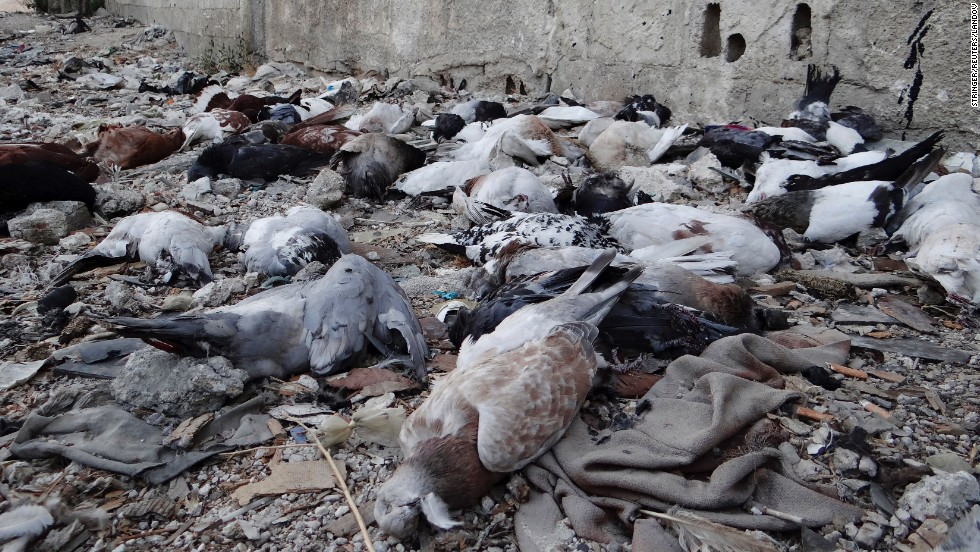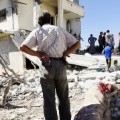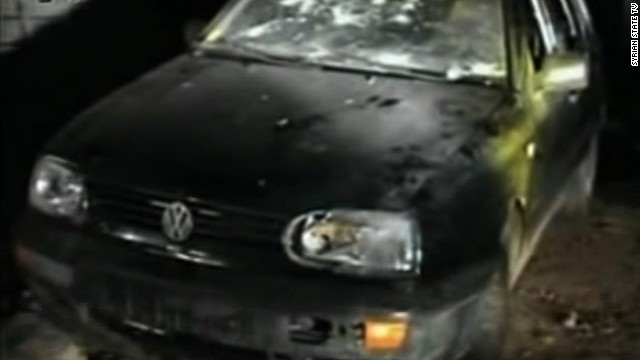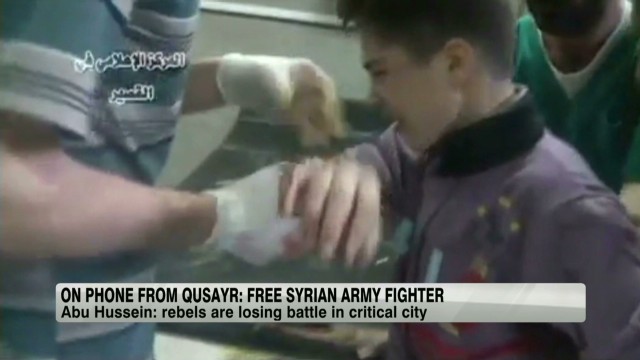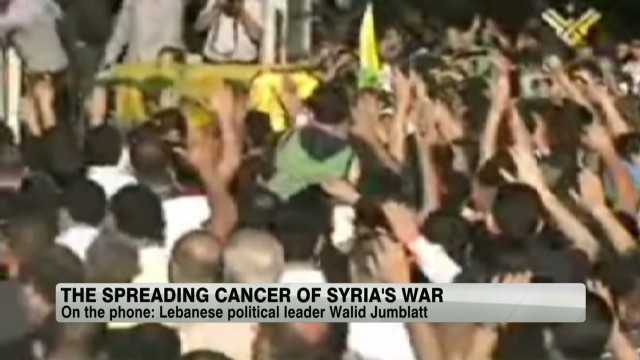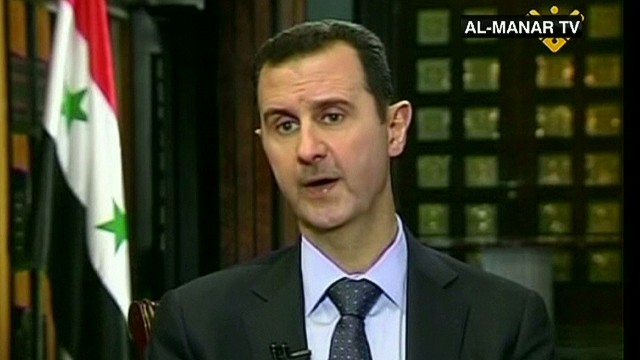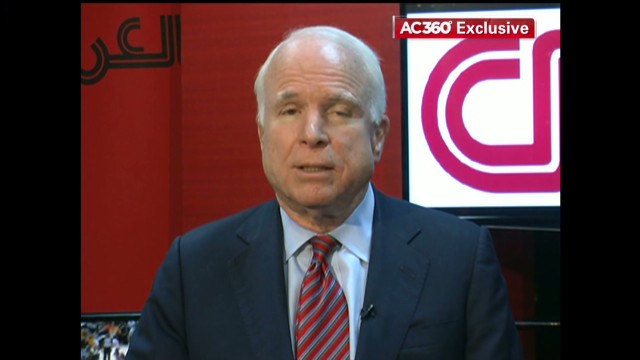Syrian civil war in photos – In this photo provided by the anti-government activist group Aleppo Media Center, Syrian men help survivors out of a building in Aleppo after it was bombed, allegedly by a Syrian regime warplane on Saturday, February 8. The United Nations estimates more than 100,000 people have been killed since the Syrian conflict began in March 2011. Click through to see the most compelling images taken during the conflict, which is now a civil war:
Syrian civil war in photos – Syrians gather at a site hit by barrel bombs, allegedly dropped by a regime helicopter on the opposition-controlled Mesekin Hananu district of Aleppo on February 8.
Syrian civil war in photos – Civilians wave national flags as they take part in a rally in support of Syrian President Bashar al-Assad in Damascus, in a handout photo released by the official Syrian Arab News Agency on February 8.
Syrian civil war in photos – A man stands next to debris in the road following a reported airstrike by Syrian government forces in the northern city of Aleppo on February 8.
Syrian civil war in photos – Medical personnel look for survivors after a reported airstrike in Aleppo, Syria, on Saturday, February 1.
Syrian civil war in photos – Syrians carry a dead body following an airstrike on February 1.
Syrian civil war in photos – A man walks amid debris and dust on January 31.
Syrian civil war in photos – An injured man is covered in dust after an airstrike on January 29.
Syrian civil war in photos – A man tries to fix electrical wires in a neighborhood of Aleppo, Syria, on January 27.
Syrian civil war in photos – Rebels and civilians check out a crater that activists say resulted from a Syrian government airstrike on an Aleppo bus station on Tuesday, January 21.
Syrian civil war in photos – Men rush to a site that Syrian government forces reportedly hit in Aleppo on January 21.
Syrian civil war in photos – Buildings lie in ruins in Aleppo on Sunday, January 19, after reported air raids by Syrian government planes.
Syrian civil war in photos – A Syrian child collects items from a garbage pile on Saturday, January 18, in Douma, northeast of the capital.
Syrian civil war in photos – A piece of exploded mortar lies in a street in Daraya, a city southwest of Damascus, on Friday, January 17.
Syrian civil war in photos – Residents search for survivors in Aleppo on Saturday, December 28, 2013, after what activists said were airstrikes by forces loyal to Syrian President Bashar al-Assad.
Syrian civil war in photos – A man appears distraught after an air raid in Aleppo on Monday, December 23.
Syrian civil war in photos – Free Syrian Army fighters sit in a damaged house in Old Aleppo on Saturday, December 21.
Syrian civil war in photos – People search for survivors amid the rubble after an airstrike in Aleppo on Tuesday, December 17.
Syrian civil war in photos – A man sits on the ground after the airstrike in Aleppo on December 17.
Syrian civil war in photos – A woman carries children following airstrikes on a rebel area of Aleppo on Sunday, December 15.
Syrian civil war in photos – Syrians look at the aftermath of an airstrike on a rebel area of Aleppo on December 15.
Syrian civil war in photos – Syrians help a wounded woman following airstrikes in Aleppo on December 15.
Syrian civil war in photos – Syrians look at the aftermath of an airstrike on a rebel area of Aleppo on December 15.
Syrian civil war in photos – Syrian rebel fighters clash with pro-government forces in Aleppo on Wednesday, December 11.
Syrian civil war in photos – A woman weeps inside a damaged vehicle after forces loyal to President Bashar al-Assad captured the town of Nabak on Monday, December 9.
Syrian civil war in photos – A rebel fighter takes position during fighting with government forces in Deir Ezzor on Monday, December 2.
Syrian civil war in photos – Shiite fighters from a group called the Hussein Brigade search for rebels from the Free Syrian Army in Hejeira on Thursday, November 21.
Syrian civil war in photos – Free Syrian Army rebels battle government forces in Aleppo on Monday, November 18.
Syrian civil war in photos – A rebel fighter holds his position in a damaged building during clashes with government forces in Deir Ezzor on Monday, November 11.
Syrian civil war in photos – A rebel fighter fires during clashes with government forces in Deir Ezzor on November 11.
Syrian civil war in photos – A rebel fighter prepares an improvised mortar shell in Aleppo, Syria, on Saturday, November 9.
Syrian civil war in photos – Two injured men are transported on a cart in Aleppo, Syria, following shelling as fighting between pro-government forces and rebels continues on Saturday, October 26.
Syrian civil war in photos – Rebel fighters hold a position in Deir Ezzor, Syria, on Thursday, October 24.
Syrian civil war in photos – An opposition fighter stands in the doorway of a building as he smokes a cigarette in Deir Ezzor, Syria, on Tuesday, October 22.
Syrian civil war in photos – People use buckets as they try to extinguish a fire that ignited at a fuel station in Aleppo, Syria, on Sunday, October 20.
Syrian civil war in photos – A Syrian opposition fighter aims a catapult toward regime forces in Aleppo, Syria, on Thursday, October 17.
Syrian civil war in photos – Firefighters extinguish a burning vehicle after two mortar rounds struck the Abu Roumaneh area in Damascus, Syria, on Saturday, October 12.
Syrian civil war in photos – An opposition fighter aims as others run for cover while they hold a position behind burning tires in the Salaheddin district of the northern Syrian city of Aleppo on Wednesday, October 9.
Syrian civil war in photos – An opposition fighter smokes a cigarette as he takes a break following the injury of his friend in the Salaheddin neighborhood of Aleppo on October 9.
Syrian civil war in photos – Smoke rises after a mortar shell hit a residential area during fighting between Syrian government forces and rebels in Maaret al-Numan, Syria, on October, 9.
Syrian civil war in photos – Rebel fighters cover a car in mud for camouflage at an undisclosed location in Syria's northwestern province of Idlib on Tuesday, October 8.
Syrian civil war in photos – Masked female rebel fighters walk alongside their trainer on a street in the Salaheddin district of Aleppo, Syria, on October 8.
Syrian civil war in photos – A rebel fighter prays moments before heading into battle in Maaret al-Numan, Syria, on Monday, October 7.
Syrian civil war in photos – A mother comforts her baby in an area where she and her family have taken shelter after fleeing their village turned battlefield in Syria's Idlib province on Sunday, September 22.
Syrian civil war in photos – A man checks an AK-47 at his gun shop in Aleppo, Syria, on Saturday, September 21.
Syrian civil war in photos – Free Syrian Army fighters take cover moments after firing a rocket toward government forces in the Idlib province of northern Syria on Friday, September 20.
Syrian civil war in photos – Rebel fighters inspect a stairwell amid fighting against Syrian government forces on Thursday, September 19, in the Saif al-Dawla district of Aleppo, Syria.
Syrian civil war in photos – A Syrian child sits in a village in the Idlib province countryside on September 19.
Syrian civil war in photos – Opposition fighters react after returning from the battlefield in the Idlib province countryside on September 19.
Syrian civil war in photos – Smoke rises after a bomb was thrown from a helicopter, hitting a rebel position during heavy fighting between troops loyal to Syrian President Bashar al-Assad and opposition fighters in the Idlib province on September 19.
Syrian civil war in photos – Rebel fighters duck behind a barricade from firing in Aleppo on Wednesday, September 18.
Syrian civil war in photos – AFP reporter Sammy Ketz hits the ground as a Syrian soldier runs past during sniper fire in Maalula on September 18. Ketz and a photographer were reporting on the ancient Christian Syrian town northeast of Damascus.
Syrian civil war in photos – A Syrian opposition fighter takes a break on a mountain near a rebel camp in Idlib province on September 18.
Syrian civil war in photos – A Free Syrian Army fighter rests inside a cave at a rebel camp in Idlib province on Tuesday, September 17.
Syrian civil war in photos – Volunteers wear protective gear to show a class how to respond to a chemical attack in Aleppo, Syria, on September 15. For two months, Mohammad Zayed, an Aleppo University student, has been training a group of 26 civilians to respond to a chemical attack.
Syrian civil war in photos – Syria's pro-Assad militia rest near Maalula, Syria, on Friday, September 13.
Syrian civil war in photos – Syrian soldiers take aim at rebel fighters positioned in the mountains of the Christian town of Maalula on September 13.
Syrian civil war in photos – Rebels parade at a former military academy north of Aleppo during a September 13 ceremony to mark an agreement to unite two rebel brigade forces.
Syrian civil war in photos – A fighter of the Popular Front for the Liberation of Palestine General Command squats next to the covered body of an alleged foreign rebel fighter in the Yarmouk refugee camp in the Syrian capital of Damascus on Thursday, September 12.
Syrian civil war in photos – An opposition fighter runs in front of a sniper curtain in the industrial area of Deir Ezzor, Syria, during clashes with regime forces on September 12.
Syrian civil war in photos – A sheet hangs across an alley way to shield fighters from sniper fire as a fighter of the Popular Front for the Liberation of Palestine General Command walks past destroyed buildings in the Yarmouk refugee camp in Damascus, Syria, on September 12.
Syrian civil war in photos – A Free Syrian Army fighter stands guard inside a damaged house in Aleppo's Qastal al-Harami neighborhood on September 11.
Syrian civil war in photos – Free Syrian Army fighters climb a flight of stairs to take positions near the Hanano barracks on September 11.
Syrian civil war in photos – A Syrian government tank is seen during clashes with Free Syrian Army fighters in Maaloula, Syria, on September 11.
Syrian civil war in photos – A funeral is held on September 11 for three Christian Syrians killed during battles with an al Qaeda-linked rebel group that took control of the historic Christian town of Maaloula from regime forces during the weekend.
Syrian civil war in photos – A man walks through a destroyed residential area of Saraqib, Syria, on Monday, September 9, following repeated airstrikes by government forces.
Syrian civil war in photos – A soldier wears a picture of Syrian President Bashar al-Assad on his chest while at a market in old Damascus on September 8.
Syrian civil war in photos – A Free Syrian Army fighter prays in a trench in the Damascus suburbs on September 8.
Syrian civil war in photos – A Free Syrian Army fighter takes up a shooting position in Aleppo on September 8.
Syrian civil war in photos – A Free Syrian Army fighter runs for cover in Raqqa province on September 8.
Syrian civil war in photos – Buildings are heavily damaged in the Salah al-Din area of Aleppo on September 8.
Syrian civil war in photos – Issa fixes a mortar launcher in the Aleppo weapons factory on September 7.
Syrian civil war in photos – A bedroom lies in ruins after clashes between government forces and rebels around Ariha on September 7.
Syrian civil war in photos – Syrian forces are seen in the Syrian Christian town of Maaloula on September 7.
Syrian civil war in photos – A Syrian soldier prepares large-caliber bullets for a machine gun in Maaloula on September 7.
Syrian civil war in photos – A man stands inside a home damaged by heavy shelling in Arbeen, a suburb of Damascus, Syria, on September 7.
Syrian civil war in photos – Men gather on the remains of a destroyed building after reported airstrikes by Syrian government forces in the rebel-held northwestern Syrian province of Idlib on Thursday, September 5.
Syrian civil war in photos – A Free Syrian Army fighter takes cover as he watches forces loyal to President Bashar al-Assad near Hanano barracks in Aleppo on September 3.
Syrian civil war in photos – Free Syrian Army fighters walk inside a damaged house in Aleppo on September 3.
Syrian civil war in photos – Free Syrian Army fighters talk inside a burnt house in Aleppo on September 3.
Syrian civil war in photos – A Free Syrian Army fighter peeks through the curtains of a bedroom in Deir ez-Zor, Syria, on Monday, September 2.
Syrian civil war in photos – Free Syrian Army fighters take their positions behind piled sandbags, as one of them points his weapon, in Deir ez-Zor on September 2.
Syrian civil war in photos – A rebel fighter points his weapon at Syrian regime forces in Deir ez-Zor on September 2.
Syrian civil war in photos – Syrian firefighters try to extinguish a fire after a missile hit a residential building in Damascus, Syria, on September 2.
Syrian civil war in photos – A U.N. arms expert collects samples during an inspection of a suspected chemical weapons strike site in the Ghouta area outside Damascus on August 29.
Syrian civil war in photos – People search for belongings in rubble in Raqqa, Syria, on August 29.
Syrian civil war in photos – Free Syrian Army fighters launch a rocket toward forces loyal to Syrian President Bashar al-Assad in Deir Ezzor on August 29.
Syrian civil war in photos – A Syrian Kurd uses hay to hide another woman in a training session organized by the Kurdish Women's Defense Units on Wednesday, August 28, in a northern Syrian border village. They're preparing if the area comes under attack.
Syrian civil war in photos – Free Syrian Army fighters escort U.N. vehicles with chemical weapons experts on August 28 through a site of a suspected chemical weapons attack outside Damascus.
Syrian civil war in photos – A Free Syrian Army fighter takes position behind sandbags in the old city of Aleppo, Syria, on Tuesday, August 27.
Syrian civil war in photos – A U.N. team leaves its Damascus, Syria, hotel in a convoy on Monday, August 26. The team was to investigate an alleged chemical attack that killed hundreds last week in a suburb of the Syrian capital. Sniper fire hit a vehicle used by the U.N. chemical weapons investigation team multiple times Monday, according to the United Nations.
Syrian civil war in photos – A Syrian soldier walks down a street in Damascus on Saturday, August 24.
Syrian civil war in photos – Pigeons lie dead on the ground on August 24 from after what activists say is the use of chemical weapons by government forces in the Damascus suburb of Arbeen.
Syrian civil war in photos – Columns of smoke rise in Barzeh after heavy shelling on Friday, August 23.
Syrian civil war in photos – A young Free Syrian Army fighter is reflected in a mirror as he takes position in a house in Aleppo on Thursday, August 22.
Syrian civil war in photos – Rebels move around a building in Aleppo on August 22.
Syrian civil war in photos – Syrian rebels claim pro-government forces used chemical weapons to kill citizens outside Damascus on Wednesday, August 21. People inspect bodies in this photo released by the Syrian opposition Shaam News Network.
Syrian civil war in photos – People search the rubble of a bombed building in Aleppo, Syria, on Friday, August 16.
Syrian civil war in photos – Men bury the bodies of six members of the same family killed in a bombing in Raqqa on Saturday, August 10.
Syrian civil war in photos – Syrian Army soldiers patrol a devastated street in Homs on Wednesday, July 31.
Syrian civil war in photos – Free Syrian Army fighters move through a hole in a wall in Khan al-Assal on Monday, July 22, after seizing the town.
Syrian civil war in photos – A rebel fighter walks past swings in a deserted playground in Deir al-Zor, Syria, on Sunday, July 21.
Syrian civil war in photos – A rebel fighter speaks with a fellow fighter through a hole in a wall in Deir al-Zor on July 21.
Syrian civil war in photos – A Free Syrian Army fighter casts a shadow on a wall as he carries his weapon in a shelter in Deir al-Zor on Thursday, July 18.
Syrian civil war in photos – Yahya Sweed, 13, is comforted by his father as he lies on a bed in Kfar Nubul on Tuesday, July 16. The boy was injured by shrapnel, resulting in the amputation of his right leg.
Syrian civil war in photos – A rebel fighter naps in a trench about 300 feet from the Syrian government forces' positions along the highway connecting Idlib with Latakia on Monday, July 15.
Syrian civil war in photos – A rebel fighter uses a hole in the wall of a destroyed school to aim at Syrian government forces in the Izaa district of Aleppo on Sunday, July 14.
Syrian civil war in photos – A Free Syrian Army fighter uses a mirror to scope out snipers loyal to Syrian President Bashar al-Assad in Aleppo on Friday, July 12.
Syrian civil war in photos – A Free Syrian Army fighter stands over a boy who was injured during shelling in Al-Bara on Monday, July 8.
Syrian civil war in photos – Members of the Free Syrian Army fire a homemade rocket toward regime forces in Deir al-Zor on Sunday, June 16.
Syrian civil war in photos – Forces loyal to Syrian President Bashar al-Assad are seen near Qusayr on Thursday, May 30.
Syrian civil war in photos – Syrian rebels take position in a house during clashes with regime forces in the old city of Aleppo on May 22.
Syrian civil war in photos – Syrian army soldiers take control of the village of Western Dumayna north of the rebel-held city of Qusayr on Monday, May 13. Syrian troops captured three villages in Homs province, allowing them to cut supply lines to rebels inside Qusayr town, a military officer told AFP.
Syrian civil war in photos – Rebel fighters fire at government forces in the northern Syrian city of Aleppo on Sunday, May 12.
Syrian civil war in photos – Searchers use a flashlight as they look for survivors among the rubble created by what activists say was a missile attack from the Syrian regime, in Raqqa province, Syria, on April 25.
Syrian civil war in photos – A Kurdish fighter from the "Popular Protection Units" (YPG) takes position inside a building in the majority-Kurdish Sheikh Maqsood area of Aleppo, on Apri. 21.
Syrian civil war in photos – People walk past destroyed houses in the northern Syrian town of Azaz on Sunday, April 21.
Syrian civil war in photos – Free Syrian Army fighters take positions prior to an offensive against government forces in the Khan al-Assal area, near Aleppo on Saturday, April 20.
Syrian civil war in photos – Men inspect damage at a house destroyed in an airstrike in Aleppo on April 15.
Syrian civil war in photos – Syrian and Kurdish rebel fighters walk in the Sheikh Maqsud district of Aleppo on April 14.
Syrian civil war in photos – A female rebel monitors the movement of Syrian government forces in Aleppo's Sheikh Maqsud neighborhood on Thursday, April 11.
Syrian civil war in photos – A rebel runs to avoid sniper fire from Syrian government forces in Aleppo on April 11.
Syrian civil war in photos – Syrian rebels observe the movement of Syrian government forces around Al-Kendi hospital in Aleppo on Wednesday, April 10.
Syrian civil war in photos – Rescue teams and security forces check out the scene of a deadly car bomb explosion in Damascus on April 8.
Syrian civil war in photos – The fighting has taken a toll on buildings in Aleppo's Saladin district, seen here on April 8.
Syrian civil war in photos – A Syrian rebel runs for cover in Deir ez-Zor on April 2.
Syrian civil war in photos – A rebel checks for snipers across the street toward the Citadel in Aleppo, Syria, on Saturday, March 30, in this photo taken by iReporter Lee Harper.
Syrian civil war in photos – A Free Syrian fighter mourns the death of a friend in Aleppo on March 30, in this photo taken by iReporter Lee Harper.
Syrian civil war in photos – A Syrian opposition fighter runs for cover from Syrian army snipers in Aleppo on Wednesday, March 27.
Syrian civil war in photos – A Syrian girl covers her face to protect herself from fumes as a street covered with uncollected garbage is fumigated in Aleppo on Sunday, March 24.
Syrian civil war in photos – A Syrian man and his family drive past damaged buildings in Maarat al-Numan, on Wednesday, March 20.
Syrian civil war in photos – Syrians carry the body of a Syrian army soldier during a funeral ceremony in Idlib province on Tuesday, March 19.
Syrian civil war in photos – Syrian rebels take position in Aleppo, the largest city in the country, on March 11.
Syrian civil war in photos – Syrian men search for their relatives amongst the bodies of civilians executed and dumped in the Quweiq River on March 11.
Syrian civil war in photos – A Free Syrian Army fighter looks back as smoke rises during fighting between rebel fighters and forces loyal to Syria's President Bashar al-Assad on the outskirts of Aleppo on Saturday, March 2.
Syrian civil war in photos – Residents read Shaam News newspapers published by the Free Syrian Army in Aleppo on March 2.
Syrian civil war in photos – A member of the Free Syrian Army reacts to the death of a comrade who was killed in fighting, at Bustan al Qasr cemetery in Aleppo on Friday, March 1.
Syrian civil war in photos – A rebel fighter throws a home-made grenade at Syrian government forces in Aleppo on February 16.
Syrian civil war in photos – A member of the Free Syrian Army stands with his weapon as he looks at a rainbow in Aleppo on February 16.
Syrian civil war in photos – A Syrian woman looks through a bus window in Aleppo on February 14.
Syrian civil war in photos – Free Syrian Army fighters walk through a dust-filled stairwell in Damascus on February 7.
Syrian civil war in photos – A Syrian rebel gestures at comrades from inside a broken armored personnel carrier in Al-Yaqubia on February 6.
Syrian civil war in photos – A rebel fighter throws a hand grenade inside a Syrian Army base in Damascus on February 3.
Syrian civil war in photos – People stand in the dust of a building destroyed in an airstrike in Aleppo, Syria on February 3.
Syrian civil war in photos – Free Syrian Army fighters run as they enter a Syrian Army base during heavy fighting in the Arabeen neighborhood of Damascus on February 3.
Syrian civil war in photos – An unexploded mortar shell fired by the Syrian Army sits lodged in the ground in Damascus on January 25.
Syrian civil war in photos – Fighters from Fateh al Sham unit of the Free Syrian Army fire on Syrian Army soldiers at a check point in Damascus on January 20.
Syrian civil war in photos – A Free Syrian Army fighter walks between buildings damaged during Syrian Air Force strikes in Damascus on January 19.
Syrian civil war in photos – A Syrian rebel fighter tries to locate a government jet fighter in Aleppo on January 18.
Syrian civil war in photos – Syrian rebels launch a missile near the Abu Baker brigade in Albab on January 16.
Syrian civil war in photos – A Syrian boy walks near rubbish next to tents at a refugee camp near the northern city of Azaz on the Syria-Turkey border, on January 8.
Syrian civil war in photos – Syrians look for survivors amid the rubble of a building targeted by a missile in Aleppo on January 7.
Syrian civil war in photos – A father reacts after hearing of a shelling by forces loyal to Syria's President Bashar al-Assad in Aleppo on January 3.
Syrian civil war in photos – A patient smokes a cigarette at Dar Al-Ajaza psychiatric hospital in Aleppo on December 18, 2012. The psychiatric ward, housing around 60 patients, has lacked the means to function properly since fighting broke out there in July.
Syrian civil war in photos – Syrians mourn a fallen rebel fighter at a rebel base in the al-Fardos area of Aleppo on December 8, 2012.
Syrian civil war in photos – Members of Liwa (Brigade) Salahadin, a Kurdish military unit fighting alongside rebel fighters, monitor the area in the besieged district of Karmel al-Jabl in Aleppo on December 6, 2012.
Syrian civil war in photos – A member of Liwa Salahadin aims at a regime fighter in the besieged district of Karmel al-Jabl in Aleppo on December 6, 2012.
Syrian civil war in photos – Two young boys sit underneath a washline in a refugee camp on the border between Syria and Turkey near Azaz on December 5, 2012.
Syrian civil war in photos – The bodies of three children, who were allegedly killed in a mortar shell attack that landed close to a bakery in Aleppo, on December 2, 2012, are laid out for identification by family members at a makeshift hospital at an undisclosed location of the city.
Syrian civil war in photos – Smoke rises in the Hanano and Bustan al-Basha districts in Aleppo on December 1, 2012 as fighting continues through the night.
Syrian civil war in photos – Damaged houses in Aleppo are seen after an airstrike on November 29, 2012.
Syrian civil war in photos – A Syrian rebel mourns the death of a comrade in Maraat al-Numan on November 20, 2012.
Syrian civil war in photos – Syrians protesters stand on Assad's portrait during an anti-regime demonstration in Aleppo on November 16, 2012.
Syrian civil war in photos – A Syrian rebel takes cover during fighting against Syrian government forces in Aleppo on November 15, 2012.
Syrian civil war in photos – Syrian opposition fighter Bazel Araj, 19, sleeps next to his pistol in Aleppo on November 11, 2012.
Syrian civil war in photos – A rebel fighter fires at a Syrian government position in Aleppo on November 6, 2012.
Syrian civil war in photos – A Syrian rebel leaps over debris left in the street while running across a "sniper alley" near the Salahudeen district in Aleppo on November 4, 2012.
Syrian civil war in photos – Rebels hold their position in the midst of a battle on November 3, 2012 in Aleppo.
Syrian civil war in photos – A man cries while being treated in a local hospital in a rebel-controlled area of Aleppo on October 31, 2012.
Syrian civil war in photos – A man is treated for wounds after a government jet attacked the Karm al-Aser neighborhood in eastern Aleppo on October 31, 2012.
Syrian civil war in photos – A Syrian rebel interrogates a handcuffed and blindfolded man suspected of being a pro-regime militiaman in Aleppo on October 26, 2012.
Syrian civil war in photos – Smoke rises from a fuel station following a mortar attack as Syrian women walk on a rainy day in the Arqub neighborhood of Aleppo on October 25, 2012.
Syrian civil war in photos – A Syrian rebel fires at an army position in the Karm al-Jabal district of Aleppo on October 22, 2012.
Syrian civil war in photos – A wounded Syrian boy sits on the back of a truck carrying victims and wounded people to a hospital following an attack by regime forces in Aleppo on October 21, 2012.
Syrian civil war in photos – A man lies on the ground after being shot by a sniper for a second time as he waits to be rescued by members of the Al-Baraa Bin Malek Battalion, part of the Free Syria Army's Al-Fatah brigade, in Aleppo on October 20, 2012.
Syrian civil war in photos – Syrian army soldiers run for cover during clashes with rebel fighters at Karam al-Jabal neighborhood of Aleppo on October 20, 2012.
Syrian civil war in photos – Smoke rises after a Syrian Air Force fighter jet fired missiles at the suburbs of the northern province of Idlib on October 16, 2012.
Syrian civil war in photos – A Syrian opposition fighter stands near a post in Aleppo on October 11, 2012.
Syrian civil war in photos – A Syrian man mourns the death of his father, who was killed during a government attack in Aleppo on October 10, 2012.
Syrian civil war in photos – A rebel fighter is carried by his friends and laid on a gurney to be treated for gunshot wounds sustained during heavy battles with government forces in Aleppo on October 1, 2012.
Syrian civil war in photos – Syrian rebels help a wounded comrade to an Aleppo hospital after he was injured in a Syrian army strike on September 18, 2012.
Syrian civil war in photos – Free Syria Army fighters are reflected in a mirror they use to see a Syrian Army post only 50 meters away in Aleppo on September 16, 2012.
Syrian civil war in photos – A Syrian man carrying grocery bags tries to dodge sniper fire as he runs through an alley near a checkpoint manned by the Free Syria Army in Aleppo on September 14, 2012.
Syrian civil war in photos – A woman walks past a destroyed building in Aleppo on September 13, 2012.
Syrian civil war in photos – Free Syrian Army fighters battle during street fighting against Syrian army soldiers in Aleppo on September 8, 2012.
Syrian civil war in photos – A Syrian man wounded by shelling sits on a chair outside a closed shop in Aleppo on September 4, 2012.
Syrian civil war in photos – A woman sits in her wheelchair next to her house, damaged by a Syrian air raid, near Homs on August 26, 2012.
Syrian civil war in photos – Members of the Free Syrian Army clash with Syrian army soliders in Aleppo's Saif al-Dawla district on August 22, 2012.
Syrian civil war in photos – A man mourns in front of a field hospital on August 21, 2012 in Aleppo.
Syrian civil war in photos – Wounded civilians wait in a field hospital after an air strike on August 21, 2012 in Aleppo.
Syrian civil war in photos – People pray during the funeral of a Free Syrian Army fighter, Amar Ali Amero, on August 21, 2012.
Syrian civil war in photos – A man cries near the graves of his two children killed during a recent Syrian airstrike in Azaz on August 20, 2012.
Syrian civil war in photos – A Syrian woman holds her dead baby as she screams upon seeing her husband's body being covered following an airstrike by regime forces on the town of Azaz on August 15, 2012.
Syrian civil war in photos – A Syrian rebel runs in a street of Selehattin during an attack on the municipal building on July 23, 2012.
Syrian civil war in photos – Syrian rebels hunt for snipers after attacking the municipality building in the city center of Selehattin on July 23, 2012.
Syrian civil war in photos – Members of the Free Syrian Army's Mugaweer (commandos) Brigade pay their respects in a cemetery on May 12, 2012 in Qusayr.
Syrian civil war in photos – Syrian rebels take position near Qusayr on May 10, 2012.
Syrian civil war in photos – A Free Syrian Army member takes cover in underground caves in Sarmin on April 9, 2012.
Syrian civil war in photos – Rebels prepare to engage government tanks that advanced into Saraquib on April 9, 2012.
Syrian civil war in photos – Men say prayers during a ceremony in Binnish on April 9, 2012.
Syrian civil war in photos – A young boy plays with a toy gun in Binnish on April 9, 2012.
Syrian civil war in photos – A Free Syrian Army rebel mounts his horse in the Al-Shatouria village near the Turkish border in northwestern Syria on March 16, 2012, a year after the uprising began.
Syrian civil war in photos – Syrian refugees walk across a field before crossing into Turkey on March 14, 2012.
Syrian civil war in photos – A rebel takes position in Al-Qsair on January 27, 2012.
Syrian civil war in photos – A protester in Homs throws a tear gas bomb back towards security forces, on December 27, 2011.
Syrian civil war in photos – A man stands under a giant Syrian flag outside the Umayyad Mosque in Damascus on December 24, 2011.
Syrian civil war in photos – A member of the Free Syrian Army looks out over a valley in the village of Ain al-Baida on December 15, 2011.
Syrian civil war in photos – Members of the Free Syrian Army stand in an valley near the village of Ain al-Baida, close to the Turkish border, on December 15, 2011.
Syrian civil war in photos – Displaced Syrian refugees walk through an orchard adjacent to Syria's northern border with Turkey on June 14, 2011, near Khirbet al-Jouz.
Syrian civil war in photos – A Syrian man holds up a portrait of President Bashar al-Assad during a rally to show support for the president in Damascus on April 30, 2011.
Syrian civil war in photos – Syrians rally to show their support for President Bashar al-Assad in Damascus on April 30, 2011.
Syrian civil war in photos – A screen grab from YouTube shows thick smoke rising above as Syrian anti-government protesters demonstrate in Moaret Al-Noman on April 29, 2011.
Syrian civil war in photos – A screen grab from YouTube shows Syrian anti-government protesters run for cover from tear gas fired by security forces in Damascus on April 29, 2011, during the "Day of Rage" demonstrations called by activists to put pressure on al-Assad.
Syrian civil war in photos – A woman sits by the hospital bed of a man allegedly injured when an armed group seized rooftops in Latakia on March 27, 2011, and opened fire at passers-by, citizens and security forces personnel according to official sources.
Syrian civil war in photos – Syrians wave their national flag and hold portraits of al-Assad during a rally to show their support for their leader in Damascus on March 29, 2011.
Syrian civil war in photos – Syrian protesters chant slogans in support of al-Assad during a rally in Damascus on March 25, 2011.





























































































